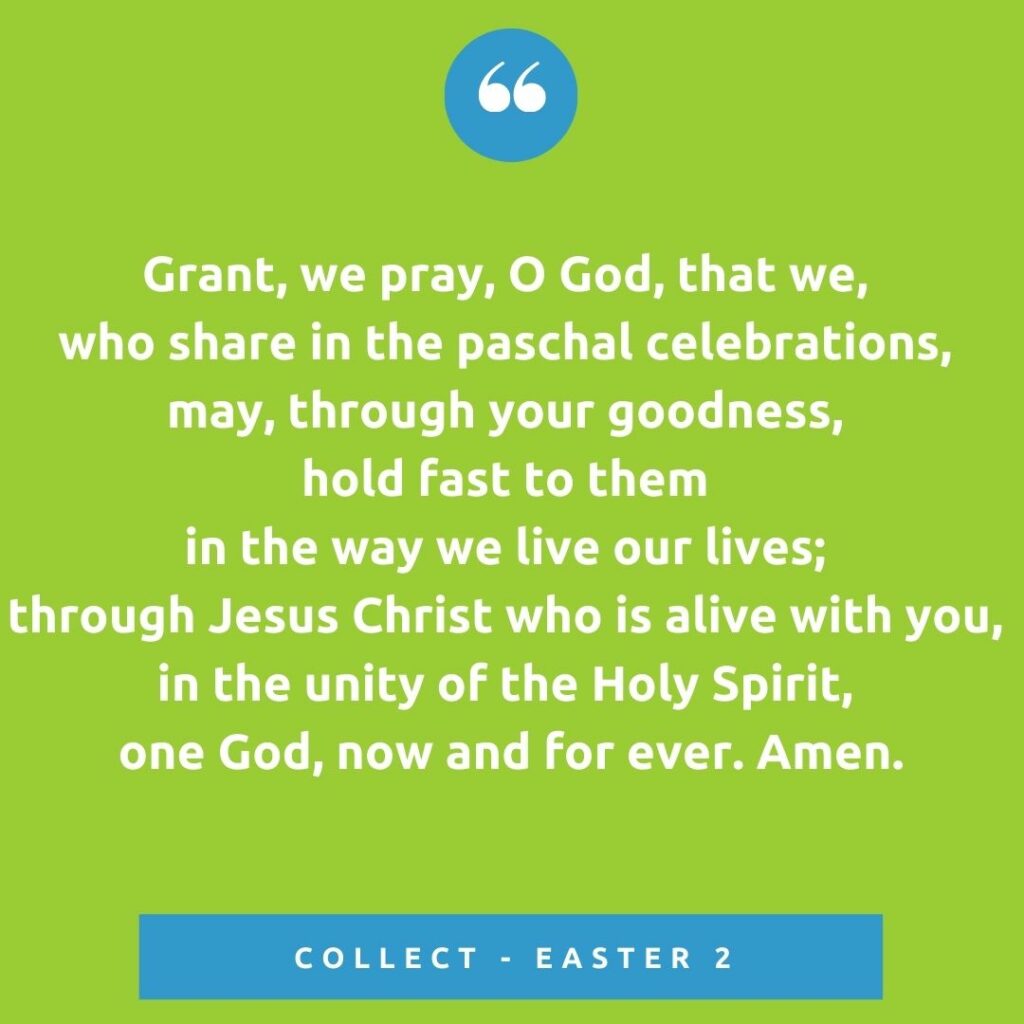
Let us pray (in silence) [that through the fifty days of Easter, the Risen Christ will touch and transform our lives]
pause
Grant, we pray, O God, [or Almighty God]
that we, who share in the paschal celebrations,
may, through your goodness,
hold fast to them
in the way we live our lives;
through Jesus Christ
who is alive with you,
in the unity of the Holy Spirit,
one God, now and for ever.
Amen.
The above is my reworking for my Book of Prayers in Common in which I seek to provide a set of collects with history and commentary.
The collect is from the eighth-century Hadrianum (a sacramentary give by Pope Hadrian I to Charlemagne in 785-786]. There it was the collect for the “Sunday after Easter” (what we would now call the Second Sunday of Easter):
Praesta, quaesumus, omnipotens Deus,
ut, qui paschalia festa peregimus,
haec, te largiente, moribus et vita teneamus
After Vatican II it was reassigned (in a revised form) as the last collect of the Easter Season (on the Saturday before The Day of Pentecost).
The original collect speaks in the past tense about the paschal celebrations. The Octave concluded them. Now, with Easter more clearly extending for 50 days, the Roman Rite has moved this collect to conclude the 50 days rather than conclude the Octave. I have done something slightly differently. I have taken the liberty of modifying the collect from past tense to the present continuous – we are early on in our paschal celebrations.
The Saint Andrew Daily Missal (1961) translates it as:
Grant, we pray, almighty God,
that we who have celebrated the Paschal solemnity,
may by Your bounty remain faithful to it in the conduct of our lives.
Through our Lord…
The failed 1998 English Missal translation has it as:
Almighty God,
grant in your goodness
that the paschal feast we have celebrated may touch and transform our lives.
We ask this through our Lord Jesus Christ, your Son,
who lives and reigns with you in the unity of the Holy Spirit, God for ever and ever.
This Sunday, the eighth day of the Easter Season is also called:
Low Sunday – the reason is uncertain, possibly in contrast to Easter Day
Quasimodo Sunday – from the Introit “Quasi modo geniti infantes, rationabile, sine dolo lac concupiscite” (“As newborn babes, desire the rational milk without guile” 1 Peter 2:2)
Dominica in albis depositis – the neophytes, those baptised at the Easter Vigil, laid aside their white baptismal robes
Pascha clausum – the close of the Easter Octave
Divine Mercy Sunday – based on devotion to the Divine Mercy promoted by Saint Faustina Kowalska. On April 30, 2000, Faustina Kowalska was canonised and this Sunday was designated as the Sunday of the Divine Mercy (Dominica II Paschae seu de divina misericordia).
The collect above has been revised for the 2002 Missal:
Deus misericordiae sempiternae,
qui in ipso paschalis festi recursu
fidem sacratae tibi plebis accendis,
auge gratiam quam dedisti,
ut digna omnes intellegentia comprehendant,
quo lavacro abluti, quo spiritu regenerati,
quo sanguine sunt redempti.
The current RC translation for the Saturday after Ascension “at the morning Mass”:
Grant, we pray, almighty God,
that we, who have celebrated the paschal festivities,
may by your gift hold fast to them
in the way we live our lives.
Through our Lord Jesus Christ, your Son,
who lives and reigns with you in the unity of the Holy Spirit,
one God, for ever and ever.
